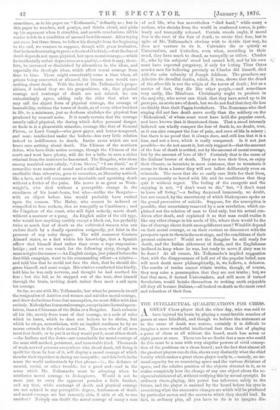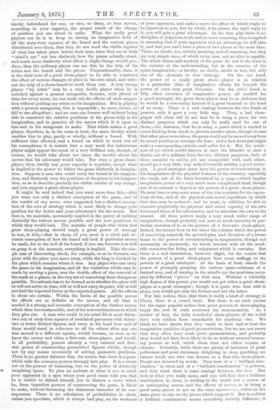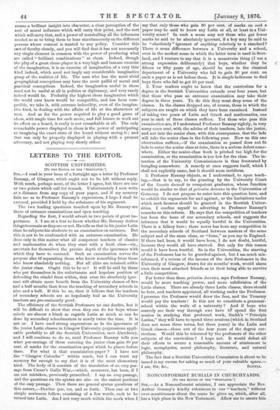THE INTELLECTUAL QUALIFICATIONS FOR CHESS.
AGREAT Chess-player died the other day, who was said to have injured his brain by playing a considerable number of games at once blindfold, and though we believe the statement as to the cause of death was untrue, certainly it is difficult to imagine a more wonderful intellectual feat than that of playing a game of chess at all without the board, much less seven or eight games at once. There can be no doubt that a man who could do this must be a man with very singular powers of vivid concep- tion of the positions on a chess-board ; and the fact that almost all the greatest players can do this, shows very distinctly what the chief faculty which makes a great chess-player really is, —namely, an un- usual capacity for so conceiving space and the various divisions of space, and the relative position of the objects situated in it, as to realise completely how the change of any one object alters the re- ciprocal relations of all, without verifying this by actual eyesight. In ordinary, chess-playing, this power has reference solely to the future, and the player is assisted by the board before his eyes in conceiving what the successive changes are which will be produced by particular moves and the moves to which they should lead. In fact, in ordinary play, all you have to do is to imagine dila-
tinctly beforehand for one, or two, or three, or four moves, according to your capacity, the proper result of the change of position you are about to make. What the really great players can do is to keep so strong an imaginative hold of all the sixty-four squares of the board and the various pieces distributed over them, that they do not need the visible register of what has taken place before their eyes, since they see in their "mind's eye" not less distinctly how the pieces actually stand, –, and much more distinctly what effect a slight change would pro-
- duce, than the ordinary player can see this by the help of his retina and the board and the pieces. Unquestionably, then, it is the chief note of a good chess-player to be able to construct the effect of various changes of place in his own mind, and with- out the help of a chess-board to work them out. A very strong player "by letter" may be a very feeble player when he is matched against a present antagonist, because, with plenty of time for every move, he can work out the effects of each sugges- tion without putting any strain on his imagination. But in playing with a present antagonist, this is impossible ; he must foresee, or fail to see altogether ; and no man can foresee well without being able to construct the relative positions of the pieces fully in his imagination, and to perceive all the moves which it is open to him and to his antagonist to make. That which makes a good player, therefore, is, in the main at least, the same faculty which enables him to play, partly or wholly, without a board. With sufficient time allowed, and a board on which to work out all his conceptions, it is certain that a very weak but industrious player might appear the equal of a very brilliant one, though, of course, he would take about ten times the trouble about his moves that his adversary would take. For even a great chess- player, then, hardly any great capacity is requisite, except what is implied in the power to follow the game distinctly in imagina- tion. Suppose a man who could carry the board in his imagina- tion, and distinctly vary the positions of thepieces in his imagina- tion, so as to describe precisely the visible results of any change, and you suppose a great chess-player.
It might be said indeed that you want more than this,—that you want not only a distinct conception of the game, and of the results of any move, once suggested, but a distinct concep- tion of the sort of strategy which is most likely to change your position for the better and your adversary's for the worse. But that is, we maintain, necessarily implied in the power of realising distinctly the various moves possible and the new positions to which they would lead. The mistake of people who think that great chess-playing should imply a great power of strategy in war, is this,—that in chess, all you need is a vivid and ac- curate conception of how the board will look if particular moves be made, for in the look of the board, if you can forecast it as well as grasp it at the moment, everything is implied. Take the sim- ple case of discovering check, for example, so as to threaten one piece with the piece you move away, while the king is checked by the piece which remains where it was. Any player who can carry the game in his imagination, and all the variations which may be made by moving a piece, sees the double effect of the removal of the mask at a glance, in the very act of conceiving these changes as possible. No estinaate has to be formed as to whether the piece will or will not arrive in time, will or will not carry its point, will or will not find the expected forces at the expected points. All the effects in chess are certain. Within the limits of the possible moves the effects are as definite as the moves, and all that is needed is a strong and accurate conception of the further moves which then becomeepossible, and of the new combinations to which they give rise. A man who could in his mind fill at most thirty- two out of sixty-four squares of tesselated pavement with thirty- two or fewer distinct figures, and carry in his head how each of them would stand in reference to all the others after any one was moved to a different square, would become, as soon as he knew the moves and rules, a first-rate chess-player, and would, in all probability, possess already a very unusual and first- rate power of constructing geometrical figures vividly, though not by any means necessarily of solving geometric problems. There is no greater delusion than the notion that chess is a game which calls the reasoning powers strongly into play. It is a strain not on the powers of reasoning, but on the power of distinctly et- imagining space. To plan an ambush at chess is not to catch your opponent in a spot where your good sense tells you that he is unable to defend himself, but to discern a move which he, from imperfect powers of constructing the game, is likely to make, without foreseeing the disastrous character of its con- sequences. There is no calculation of probabilities in chess, unless you speculate, which is always bad play, on the weakness
of your opponent, and make a move the effect of which ought to be injurious to you, but by which, if he misses the right reply to it, you will gain a great advantage. In the true play there is no discipline of judgment at all, and no more reasoning than is implied in assuming that if your opponent sees an advantage he will take it, and that you can't have a piece at two places at the same time. These, no doubt, are, strictly speaking, acts of reasoning, but they are very simple ones, of which every man not an idiot is capable. The whole charm and mystery of the game lie not in the least in the exercise of the understanding, but in the exercise of the space-imagination,—a faculty, no doubt, useful in war, but only
one of the elements in true strategy. On the one hand, the power of a really great chess - player is in relation to a particular class of imaginative efforts far beyond the power of even very great Generals. On the other hand, in fifty other exercises of imaginative power, all needful for a good strategist, the great chess-player may be so deficient that he would be a non-entity instead of a great General at the head of an army. There is a real analogy between the two kinds of powers, only it goes a very little way. Thus, a bad chess- player will often fail to see that he is using a piece for two distinct purposes which can only be really used for one of them,—for instance, that lie is using a pawn which is needed to cover his king from check to protect another piece, though in case that other piece were taken, the pawn could not be moved away from its actual position to revenge the-loss ; and a bad strategist might make a corresponding mistake and suffer for it. But the quick- ness of eye which would discern at once the blunder in such a double use of a military force for two distinct purposes, both of them essential to safety, yet not compatible with each other, would go a very little way indeed towards making a good strate- gist. A good strategist must have the power of constructing in his imagination all the physical features of the country, especially the roads, out of the hints furnished by a map,—which implies imaginative power of a very much more complicated kind, though not of so unusual a degree as the powers of a great chess-player. He must have a very exact sense of the time requisite for the opera- tions of war, and of the physical and moral expedients by which that time may be reduced ; and he must, in addition, be able to conceive graphically the physical and moral capacity of his own forces and those of his adversaries, and to stimulate his own to the utmost. All these powers imply a very much wider range of imagination, though probably not near so much intensity in par- ticular exercises of it, as the powers of a first-rate chess-player. Indeed, the former bear to the latter the relation which the power of conceiving minutely the ground-plan and elevation of a house bears to the power of reconstructing in imagination, though not necessarily so accurately, its whole interior with all the avail- able resources for living and enjoyment which it contains. But there is a real foundation, however slight, for the notion that the powers of a great chess-player bear some analogy to the powers of a great strategist. At the basis of both stands the power of promptly grasping the various space-relations of a limited area, and of varying in the mind's eye the positions occu‘ pied by different " pieces " on that area. Without a tolerably high degree of this power, you-would not get either a great 'chess- player or a great strategist ; though it is quite tree that with it alone, you would get only the former and not the latter.
For this notion, then, that there is really a kind of strategy in Chess, there is a sound basis. But there is no such excuse for the vague popular notion that great powers of chess-playing imply the sort of craft necessary for statesmanship. As a matter of fact, the truly wonderful chess-players of the world have very seldom been remarkable for anything else. We think we have shown that they ought to have had at least the imaginative qualities of good geometricians, but we are not aware that they often have made' great geometricians, arid probably they would not have been likely to do so without unusual reason- ing powers as well, which chess does not either require or educate. Certainly, while there are plenty of instances of great politicians and great statesmen delighting in deep gambling, we cannot recall one who was known as a first-rate chess-player. People are deceived by words. They hear of a " brilliant com- bination" in chess and of a "brilliant combination" in politics, and they think there is some analogy between the two. But look at what you really mean, and you will find that a brilliant combination in chess, is nothing in the world but a power of so anticipating moves, and the effects of moves, as to bring a good many pieces to act on the same square—Le., either on the same piece or else on the pieces which support it. But in politics a brilliant combination means something entirely different; it means a brilliant insight into character, a clear perception of the sort of moral influence which will carry this' point, and the sort which will carry that, and a power of marshalling all the influences needed so as to bring them to bear simultaneously on the different persons whose consent is wanted to any policy. Consider this sort of faculty close]y, and you will find that it has not necessarily any single element in common with the power of producing what are called " brilliant combinations" at chess. Indeed, though the play of a great chess-player is a very high and intense exercise of the imagination, it is an exercise of imagination of a very thin Iind indeed, which need not imply any considerable imaginative grasp of the realities of life. The man who has the most vivid geographical conceptions may have the most pallid of moral and practical conceptions. Indeed, the imagination useful in chess need not be useful at all in politics or diplomacy, and very rarely indeed would be. Probably the highest chess imagination which the world ever knew would be compatible, and has been com- patible, we take it, with extreme imbecility, even of the imagina- tive kind, in dealing with the affairs of life or the characters of men. And as for the power required to play a good game of chess, with ample time for each move, and full leisure to work out its effect on a board, it really is not remarkable at all. The only remarkable power displayed in chess is the power of anticipating or imagining the exact state of the board without seeing it ; and That can only be properly displayed in playing with a present adversary, and not playing very slowly either.




































 Previous page
Previous page